Foolish Heart: Breathless (TV post)
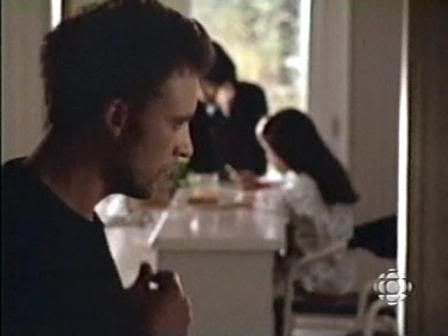
Foolish Heart is very hard to describe. It doesn't fit neatly into any one mold. The six episodes feature a series of interconnected stories of love and betrayal. Minor characters in one episode step into the spotlight in others.
In Breathless, Peter is the director of a show called Foolish Heart. Barbara is the writer. They are immediately attracted to one another and embark upon an affair despite being married to others. Peter turns the story of their affair into a story for his show. Callum plays Ross, Barbara's husband, in a very small role.
The IMDB page: Foolish Heart: Breathless, 1999.
Cast / Characters:
Ken Finkleman
Sarah Strange
Clare Sims
Arsinée Khanjian
Deitre Courchesne
Callum Keith Rennie
Jennifer N. Scott
Jennifer Wigmore
Peter
Barbara
Louisa
Lena
Claire
Ross
Jennifer
Rachel
Original Air Date: March 24, 1999 (Season 1, Episode 4)
Runtime: 30 minutes
Country: Canada
IMDB rating: No rating - less than 5 votes
Genre: Comedy, Drama
Keywords: None
Awards:
Gemini Awards:
2000, Best Direction in a Dramatic Series, Ken Finkelman, win
1999, Best Direction in a Dramatic Series, Ken Finkelman, win
1999, Best Performance by an Actress in a Continuing Leading Dramatic Role, Arsinee Khanjian, win
1999, Best Dramatic Series, Ken Finkelman & Brian Dennis, nominated
1999, Best Performance by an Actress in a Featured Supporting Role in a Dramatic Series, Sarah Strange, nominated
1999, Best Writing in a Dramatic Series, Ken Finkelman, nominated (For episode "The Correct Decision")
Writer's Guild of Canada:
2000, WGC Award, Ken Finkelman, won (For episode "Breathless")
There is 1 user comment.
One example:
Handsomely directed, well-acted, pretentiously scripted., 12 September 1999
"Foolish Heart" is a handsomely directed, well-acted, but pretentiously scripted series of interconnected stories about love and betrayal. Among the highlights are performances by Sarah Strange (in a dual role as two very different cynical writers) and Arsinee Khanjian (as an Armenian cleaning woman trying to keep her son out of jail). As well, the very talented Patricia O'Callaghan gets to sing several great cabaret-style numbers, including the title song.
Unfortunately, writer/director/star Ken Finkleman seems to be labouring under the delusion that if his characters talk endlessly about Chekhov, his script will itself be on a Chekhovian plane. Accordingly, Finkleman drops in more references to Great Dead Intellectual Authors in a single half-hour episode than Woody Allen would able to shoehorn into his next five films. Finkleman then desperately tries to make his script "critic-proof" by having characters continually accuse Finkleman's writer/director character of writing that is hackneyed, pretentious and naive; Finkleman's responses are meant to enlighten us to the fact that what we are watching is Art, dammit, and that anyone who disagrees is clearly a vulgarian. "Gosh, Ken," we're meant to say, "you're an intellectual guy who's read Tolstoy -- how could anyone possibly disagree with your artistic opinion?"
Well, I've read Tolstoy, too, and ultimately, despite several worthwhile moments, "Foolish Heart" stops well short of being "War and Peace". Finkleman spends more time trying to fend off his detractors than he does in creating his Art, and the show quickly devolves into a talky, self-referential mess. If you want my advice, Ken, next time answer your critics by creating material that involves as well as enlightens, and that's universal as well as personal. Sure it's difficult...but if you go back and re-read Tolstoy, Chekhov and all the other Great Dead Intellectual Authors, they'll show you how to go about it.
You can find it here.
Callum Quotient: Approx. 5% Two very short scenes.
Pictures:
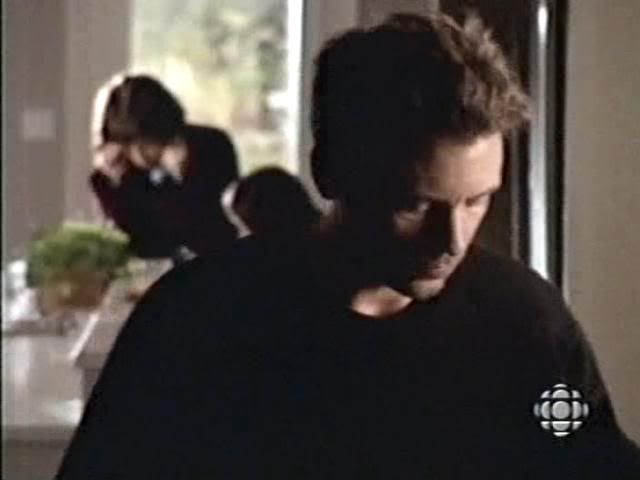
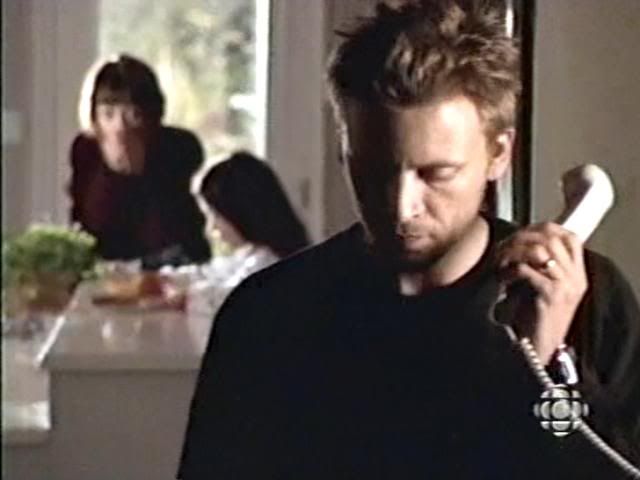
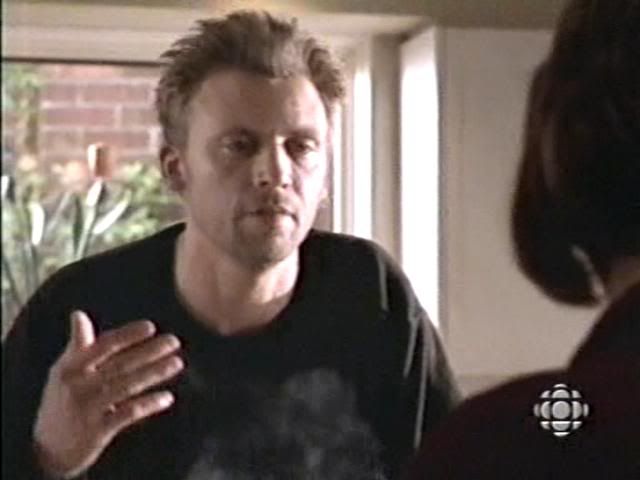
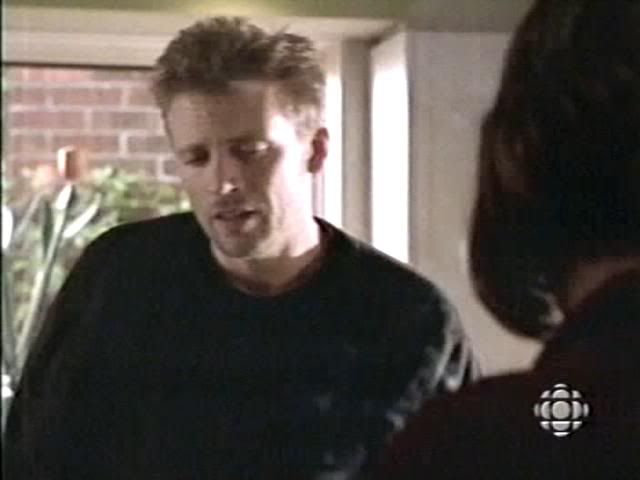
Quotes:
- Reporter: And you believe your version of this love story will get to the truth?
Peter: Ah, It's an attempt.
Reporter: But this story is yours being told by you. How can there be any objective truth in that?
Peter: I'm honest.
Reporter: You? Impossible. You may think you have self-awareness but all you know is your ego. - Peter: I'm going to say something that I don't want you to take too seriously. I'm infatuated with you. Now I had to say that because I had the feeling if I didn't, it's an impulse that just would've faded away and had no life at all. Now it has a life.
Barbara: And now we should kill it. - Ross: (Barbara calls Peter. Ross picks up the extension.) Barbara tells me you two are having an affair. Is that true? Do you wanna talk about it?
- Ross: Look at me. Look at me. I don't believe this. I don't... Look at me. heavy sigh You're not the person I thought you were. Ummm. Get out. Get out of this house. Just get out. Okay.
Trivia:
- Sara Strange has appeared in Da Vinci's Inquest, Men In Trees, Touching Evil: Memorial with CKR as well as the much loved ReGenesis. And like CKR she shows up in many US shows filmed in Vancouver.
- Arsinee Khanjian appeared in Last Night.
Interesting scenes: For our purposes, there's only one interesting scene.
- Peter and Barbara in the restaurant.
- Ross finds out.
- Peter tells his wife.
- Ross confronts Barbara.
- Peter tells Barbara a story about the man who couldn't make the jump.
Do I want to show this to my parents / friends / co-workers?
Poll Foolish Heart: Breathless
Ross
Poll Ross
Does he die?
You really want to know? Are you sure? Really sure? Well, then. (highlight to read)
::Nope. ::
Articles/interviews
FOOLISH HEART (TV Series)
(1999) * * 1/2 Ken Finkleman, Sarah Strange, Clare Sims, Arsinee Khanjian, Tony Nardi, others.....
Quasi-anthology focusing on different characters each episode, but interweaving them with the characters from the other episodes, all under the surrealistic umbrella of filmmakers (Finkleman and Strange) making a TV series (the characters would be interrupted in mid-story to be interviewed by the camera).
Finkleman's third series in as many years was better than his problematic More Tears, but no where near The Newsroom. This time eschewing comedy entirely, these "relationship" dramas benefitted from good performances, direction and decent dialogue, but precious little genuine insight. Finkleman portrayed love affairs, infidelity, etc., but never answered why these particular characters behaved in this particular way in these particular circumstances...which is, surely, the heart of storytelling. Anyone can tell you something happened...a storyteller conveys why.
The final two episodes tried to veer into comedy and even greater surrealism, but suffered because humour is, surely, the result of the real meeting the surreal; surrealistic gags in a surrealistic context just kind of sit there. More to the point, doing a whole episode meant to analyse a character when that character doesn't remotely approach being a fleshed-out, 3-dimensional characterization is just another example of the series' flash and sizzle over substance.
Ironically, this "cutting edge" series was more than a little reminiscent of the kind of National Film Board drama you'd be expected to watch in school (at least the first four episodes). Finkleman (and his fans) were quick to point out European art film influences, while neglecting to mention the obvious hints of the style of Britsh TV writer Dennis Potter -- though Finkleman couldn't match Potter'ss flare for colourful dialogue or eccentricity. Though the monologue where Finkleman's character breaks off an affair was some right good writing. 6 half hour episodes on the CBC.
From here.
Foolish heart: Ken Finkleman on the nature of love, sex & adultery
TAKE ONE, Spring, 1999 by Cheryl Binning
Ken Finkleman is sitting behind a desk, hand resting on his face, his expression somewhat bored or tired perhaps. He is positioned so he can look out the window, and at the same time acknowledge my entrance as the CBC publicist leads me into his office. "Can I get you a coffee or anything?" she asks. I decline but Finkleman is suddenly attentive.
Publicist: "Do you want a chocolate bar?"
Finkleman: "Uhm, you know what I want...one of those yellow...Quaker..."
Publicist: "Yellow, you mean..."
Finkleman: "...Quaker...ah...low fat...banana nut...you know those...granola bars."
Publicist: "Granola bars?"
Finkleman: "Yeah, those granola bars."
Publicist: "Are they chocolate or plain?"
Finkleman: "The yellow ones."
Publicist: "The yellow ones?"
Finkleman: "The yellow container."
Publicist: "Oh, okay, all right."
I sense that I have just walked into a scene from The Newsroom where George Findlay would often agonize over his muffins, his parking space and other minute details of daily life. But that was two series ago. I am here to discuss Finkleman's latest creation, Foolish Heart, another series for the CBC, another project written, directed, starring and executive produced by Finkleman. But that would appear to be where the similarities end. The over-the-top antics of The Newsroom provided a comical take on TV news. Then came More Tears, offering a far darker and sinister satire of the media's manipulation of the truth. Now love is targeted as the culprit. In Foolish Heart, Finkleman's first foray into drama, love plays havoc on the lives of those of us weak beings who fall prey to its spell.
"He can't help himself, it's the nature of love," says the director George Findlay, the character once again resurrected in Foolish Heart. Sex and adultery definitely played their part in The Newsroom and More Tears, particularly when it came to George and his philanderings. But in Foolish Heart it comes to the foreground with a vengeance. Passion, affairs, betrayal, lies, disintegrating marriages and death are the strands of a tangled web that hold together the characters in the first four episodes. The connections are revealed slowly as the characters weave in and out of story lines and face the repercussions of the destructive force of love.
In the first episode, an architect steps into a puddle, causing a chain of events leading to her affair with the man for whom she is designing a dream home. Ultimately, the relationship destroys two marriages and breaks up both families. Finkleman describes the episode as "the architecture of an affair. You don't connect with the characters," he explains. "You don't have any idea why they fall in love. It's not important. It's just an attempt to show how an innocent flirtation can end up in disaster, tumble out of control. It's simply an attempt to look at the superstructure of an affair. I have never seen that done before." Over the following episodes, the architect's Armenian cleaning lady, who has given up on men after her own unsuccessful love affairs, pours all her love into her son. He becomes involved with a gang of troubled teens and ends up dead. The judge who had given the boy a break loses his wife to a waiter. His new-found happiness with the Armenian cleaning lady is shortlived. She leaves his bed to reunite with her old love.
I ask Finkleman about the genesis of the idea for Foolish Heart. "I don't know, it was just something different." I press him further. "It's not like you are struck by some kind of revelation suddenly. You have nothing to do basically when you are a writer, you have nothing to do. Are you a writer?" "Yes," I say, uncertain where this is heading. "So why don't you turn that off," he says with a schoolboy grin, pointing to my tape recorder. As I try to explain that I would miss half the conversation if I tried to write it all down, he laughs and interrupts. "I was reading a book and something interested me and I started writing a speech that ended up being a speech in the third episode. That was the first thing I wrote. It had no context. I put it in the mouth of a character and muddled my way through."
In Foolish Heart, the intertwining of the scripted and real world reaches Pirandelloesque heights. From the opening scene we are introduced to the film crew setting up for the upcoming shoot while a documentary unit follows the director and writer who explain the themes of the upcoming drama. We literally see one of the characters having her hair and make-up done as she rants about her cheating husband, and becomes frustrated that the director's only response to her ramblings is that she is "jumping ahead in the story." The director calls action and she walks through a door, onto the set, and into the love story. Throughout the episodes, intense emotional scenes are broken with a cut to the on-set rehearsal of an upbeat musical number for George's show and the camera hovers on characters as the writer asks them analytical, probing questions. "I am tired of this confusion between reality and fantasy," says a lovelorn waiter who is constantly spouting out lines from old movies and classical novels.
"Each episode is a story," says Finkleman, "so I think the audience will find it easier to take. But then I think some of the stories are so complex and unlike television that they might not watch it." One episode, for example is entirely in subtitles with the characters speaking Armenian and French. "Can you imagine asking people who watch Seinfeld to sit through a show in Armenian," chuckles Finkleman, quite amused by the idea. In typical Finkleman fashion (recall the "meltdown" episode in The Newsroom), the final episodes veer off into another dimension, in this case a Kafkaesque trial in the tradition of the Theatre of The Absurd. A man is so overwhelmed by his feelings of guilt for having an affair, he dreams he is being put on trial for adultery. The final episode is a light-hearted romantic comedy, shot in black and white, reminiscent of the Hollywood romantic comedies of the 1940s. I ask Ken why all his series seem to take off on a different path after the first four episodes. "That's because I start off with an idea and then after the third episode the whole thing collapses because you realize you have run out of ideas. But in this show I sustained it. Every episode is about different types of love or relationships. It is all effused with this idea of love."
Missing from Foolish Heart is Finkleman's long-time coproducer Peter Meyboom, who has worked with Finkleman since their first series, Married Life. Meyboom was unavailable because of a project he was doing with Alliance Atlantis. Brian Dennis (The Rez) was brought on board. "It was difficult at first," says Dennis. "Ken doesn't like to work with new people. It was a difficult courtship but we found a way to make it work. We found an uneasy alliance. This is Ken's show, you can't take control. He resists that strenuously. You can just gently put forward options for him to say yes or no to."
The mingling of fact and fiction in Finkleman's scripts have parlayed into stories about the filmmaker himself. Rumours abound of Finkleman as the on-set tyrant, the control freak, the artist gone mad. Sarah Strange (Madison), who plays a leading role in Foolish Heart, says she was terrified at the prospect of first meeting Finkleman. "I had heard of the legend of `the force,' the Ken Finkleman force. He is like this and like that, he is a genius, he's very troublesome, be careful, watch what you say...and then the instant I met him, he was entirely familiar to me, we got along great. I thought he was funny and charming." As a director, Strange says Finkleman was collaborative. "It was all true to his personal vision but it so closely matched mine that I never felt he was bossing me around."
There was a similar response from Larissa Laskin (Peacekeepers), who said "yes" to Foolish Heart before even seeing a script. "As an actor, there are certain ways I interpret love or anger but Ken makes me think differently about things. It is his interpretation, not my interpretation, but I guess it becomes mine as well." Props master Brad Lemee, a veteran of The Newsroom, More Tears and Foolish Heart, says Finkleman is not at all what he appears on camera. "People have a tendency of confusing the art with the artist," says Lemee. "As George, he comes across as very cold-hearted but he is actually very kind and sincere, patient, quiet almost. I think quite often he likes to keep the audience and the media guessing as to the type of person he really is." However, Finkleman's penchant for sarcasm is noted by many. "Ken is a very bright man," says first A.D. Marc Pancer. "He often knows what you are saying 10 words into your sentence and says, `Okay, got it, thank you, thank you, understood, yes, yes, that's fine, go, go....' Some could construe that as rude but once you get to know him, you just come to him with a quick point."
On Finkleman's character, editor Alan Novack (who is probably Finkleman's longest-lasting and closest cohort) says, "He is tough and hard-nosed and knows how to get what he wants and can be insistent but he does listen to people. He is just as likely to listen to a suggestion from a production assistant as anyone else." If Finkleman hates something, he is brutally honest, says Laskin. "I remember one time after a scene he came over and said, `What the hell are you doing? You were completely a different person. I don't know where you get this from. No, it seems ridiculous."' Laskin's response: "I find it quite humorous. He's not angry. He uses it to propel you to go somewhere else." Laskin says he is also the first to make fun of himself and point out his own mistakes. "He makes a joke out of himself all the time and he expects you to have the same sense of humour." He also has a sensitive side, she says. "Ken can give insight into scenes and characters that are very human," explains Laskin. "Not to say he's not human, but when you first meet Ken, because he is very clever and dry, you don't expect that kind of emotional depth."
So what can we expect next from Finkleman? "I don't think I can do more of this kind of thing," he says. "I don't know if the CBC can afford it. The ability to do these shows is determined by one very significant thing which is that I don't have to write for the market." Finkleman spent 20 years in L.A. doing rewrites for studio films like Airplane 2 before returning to Canada. "The CBC financed the show and doesn't feel they have to make money back or sell it to another source to justify the expense. I don't know if the CBC is still in that situation and as soon as you have to write for foreign sales it changes the character of the show."
The phone rings. "Yeah, I am right in the middle of an interview with the press. Put him on. I'm doing an interview with the press. Yeah, that is foremost in my mind right at this moment. Yeah, I am actually right here with this person. Oh yeah you were there, I saw Grazer there. Nicholson's speech wasn't bad. I thought I would see you beside Grazer? Were you sitting, beside Grazer? Oh, is that what I was watching? The Golden Globes? Is that where Nicholson was? I will call you right back. "That's one of my two friends in L.A." explains Finkleman. "I am working on a project with him. He is one-third owner of Imagine TV, the company behind Felicity." Finkleman laughs mischievously. "I am supposed to be doing a show for him right now, but I keep putting it off. I'm doing it just for the money," he adds quickly. I ask if he will make one of those market-driven shows he was talking about if he can't do any more projects under the CBC roof. "I might have to." "Would you go back to L.A.?" I ask. "Those shows I wouldn't do here."
COPYRIGHT 1999 Canadian Independent Film & Television Publishing Association
COPYRIGHT 2004 Gale Group
Found here
Links
scriggle posted Foolish Heart: Breathless picspam here.
The now defunct CBC Foolish Heart site via The Wayback Machine.
Availability
Foolish Heart is not commercially available.